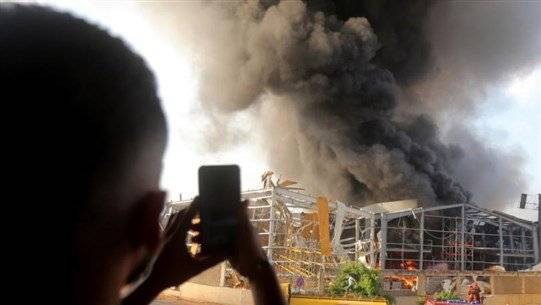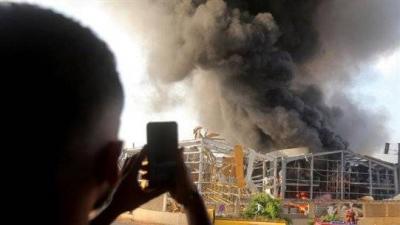Both the judiciary and the security forces affirm that investigations into the Beirut port explosion are entirely concluded. They possess the complete narrative of what transpired: how the ammonium nitrate shipment arrived, how it was stored, and how it exploded. However, the full account has yet to be released. Is the goal to turn the crime into a "shirt of Othman" rather than disclose the truth? Two years have passed since the Beirut port explosion on the fourth of August, and no news has emerged nor messaging received. Nobody knows what occurred on that fateful day. Fragments of narratives have circulated in the media. Leaks and counter-leaks abound, with each party claiming to have the truth while no one knows what truly occurred. Is there an actual murderer, or are all parties varying degrees of victims? No one denies the negligence that led to the assembly of components for a massive bomb in hangar number 12 over seven years, culminating in the colossal explosion that devastated Beirut, but the discussion here revolves around a hidden perpetrator who ignited the spark!
**Project Distrust**
On August 4, 2020, a massive explosion shook the capital Beirut, resulting in the deaths of 232 people and injuries to thousands. Judge Fadi Sawwan was appointed as the investigative judge but remained for six months before being removed by the Court of Cassation due to the legitimate suspicion raised by MPs Ali Hassan Khalil and Ghazi Zeaiter in February 2021. Sawwan did not present any new evidence in the investigation conducted in the media, attempting to appease public opinion. He raised the stakes of his claims, limiting them to political officials, despite the fact that responsibility is primarily security and military. He sought to hear former caretaker Prime Minister Hassan Diab and former Finance Minister Ali Hassan Khalil, along with former Public Works Ministers Youssef Finyanos and Ghazi Zeaiter as defendants, in addition to the General Director of State Security, Major General Tony Saliba. He also issued arrest warrants for several port officials, including guards, security personnel, and administrators.
However, Sawwan did not summon former Army Commander Jean Qahwaji, nor former Chief of Staff Walid Salman, who signed on behalf of Qahwaji to propose offering the ammonium nitrate to the Shamas company in hopes they might buy the seized goods at the port. Sawwan granted immunity to the previous and current military leadership due to their influence over him, as he had been an investigating judge in the military court for ten years. It was not understood why Sawwan chose the current Prime Minister and three former ministers. If the current Prime Minister were an offender or negligent, it would inevitably imply that ministers in his government are also offenders and negligent. And if responsibility lies with the former ministers, why were former prime ministers excluded?
**Claims and Prosecution Warrants**
The important thing is that Sawwan was succeeded by investigative judge Tarek Bitar. His name was suggested by the Minister of Justice to receive the approval of the Supreme Judicial Council. Everyone was hopeful about the arrival of a judge unknown for his political alignment, apart from a national affiliation to his Akkar family. Similarly, there were no questions regarding his integrity as he had not yet been scrutinized. Bitar found himself caught between two options: following Sawwan’s path by exaggerating matters, even at the expense of the truth, or opting for an investigation in search of the full truth, even if it displeased anyone. No one anticipated the course Bitar would take. He dedicated himself to the investigation, interviewing dozens of witnesses and defendants. Four months later, he completed the first phase. In July 2021, Bitar sought permissions to prosecute leaders of security agencies and lift the parliamentary immunity of MPs suspected of being complicit in deliberate neglect, knowing the danger that caused the explosion. He sent a letter to the Parliament requesting the lifting of legislative immunity from former Finance Minister Ali Hassan Khalil, former Public Works Minister Ghazi Zeaiter, and former Interior Minister Nohad Machnouk. He also sent two letters, one to the Beirut Bar Association seeking permission to prosecute Khalil and Zeaiter as they were lawyers, and the other to the Tripoli Bar Association to seek permission to prosecute former Public Works Minister lawyer Youssef Finyanos for questioning all of them concerning the probable intent of the crime of homicide and charges of negligence and neglect. He also charged officers in the former and current army leadership, including former army commander Jean Qahwaji and former Intelligence Director Major General Kamil Daher, as well as the General Director of General Security Major General Abbas Ibrahim and the General Director of State Security Major General Tony Saliba. He also requested the prosecution of judges suspected of being complicit in the neglect resulting in the explosion, but he did not approach the current Army Commander Joseph Aoun. He also sidelined the Legal Affairs Directorate in the Ministry of Justice and all ministers of justice and defense.
**Accusation of Selectivity**
Thus, a segment of the Lebanese populace deemed targeted by the prosecution believed the allegations lacked comprehensiveness and were selective, as they centered on personalities considered aligned with a specific political faction, while unjustifiably excluding officials who had held the same positions, given that accountability is continuous and does not exempt the excluded from responsibility since the greater responsibility falls on the military leadership and the judiciary. All of this has intensified skepticism regarding the performance of investigative judge Tarek Bitar. Had the investigative judge included all those being interrogated and prosecuted, along with everyone who held responsible security and political positions regarding the port, he would have avoided allegations of selectivity. Security responsibility comes first, followed by functional, judicial, and political accountability, but the investigative judge began inversely.
The judge should have approached the case differently, examining all suspected parties with a uniform perspective, carefully treating all parties in good faith to avoid accusations of preconceived judgments against them, but this did not occur. Distrust was accompanied by street tensions. Hezbollah's Secretary-General Sayyed Hassan Nasrallah spoke out against the politicization of the investigative judge and the direction of the investigation. Nasrallah demanded the judiciary announce the preliminary results of the investigation, but this did not happen. No judicial decision has been issued revealing what truly took place, even though Bitar had received a second report from French investigators that excluded the hypothesis of the port being targeted by a missile, based on soil analysis at the explosion site showing no external factor (whether a bomb or missile) caused the explosion.
The division moved to the streets and then into the judiciary. Judges split among themselves. The political clash turned into a judicial confrontation, subsequently dragging the investigation into a phase of obstruction. Requests for disqualification, suspicion, and legal disputes were presented by most of the politicians being prosecuted. Each time a decision was made to reject a disqualification request, a new one promptly followed to exclude the investigative judge. This caused a paralysis of the case. The judicial process was frozen at the same time the investigative judge insisted on not stepping down. He declared his commitment to the case until the last moment. The second anniversary of the Beirut port explosion passed. The Information Branch completed its investigations and outlined the trajectory of the nitroglycerin from storage to its detonation, yet no indictment has been issued.
Since the inception of the investigation, the investigative judge considered several hypotheses, including the aerial targeting hypothesis which was dismissed by the French investigators' report. Two hypotheses remain: first, an error occurred during the welding of the door of hangar number 12, leading to the outbreak of the fire which then resulted in the explosion. The second hypothesis is that a deliberate security or terrorist act took place within the port causing the catastrophe, whether in terms of bringing in and storing the nitrates or exploiting their presence to explode them.
After two years, the only option left for investigative judge Tarek Bitar is to go public and report on what happened. Was there an intentional explosion at the Beirut port, or was negligence the cause of this catastrophe? The answer is very simple despite its gravity, but the wait for it has been unreasonably long.




